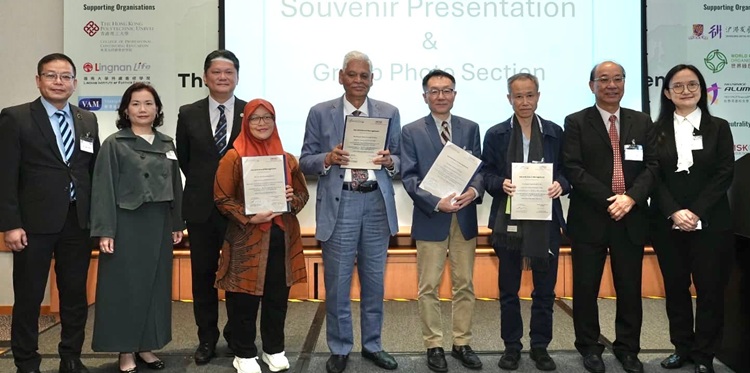Regional leaders from business, academia, and government highlight ESG as a shared framework for sustainable growth
HONG KONG SAR, October 27, 2025 — The International Chamber of Sustainable Development (ICSD) and the Hong Kong Public Administration Association (HKPAA) jointly convened the APAC ESG Forum: The Impacts of ESG on Business and Government — An Asia-Pacific Perspective, at the Hong Kong Convention and Exhibition Centre. The landmark event — celebrating ICSD’s 5th anniversary and HKPAA’s 35th year of establishment — brought together thought leaders from across the region to chart a shared path toward sustainable governance and responsible business transformation.
The forum underscored the central role of Environmental, Social, and Governance (ESG) principles in shaping the future of Asia-Pacific economies, which continue to drive global growth amid intensifying climate, technological, and social challenges.
Bridging Business and Government Through ESG
With participation from experts across Hong Kong, South Korea, India, Singapore, and Indonesia, the forum examined how ESG frameworks are reshaping organisational strategy, public policy, and stakeholder engagement.
Dr. Angus Yip, Founding Chairman of ICSD, described the event as “a timely platform for advancing sustainable thought leadership in the world’s fastest-growing region.” “In today’s rapidly evolving global political and economic landscape, ESG integration has become vital for both business and government. This forum enables professionals to understand ESG’s diverse impacts across Asia-Pacific’s vibrant markets — from regulation to technology, and from governance to culture,” Dr. Yip said.
Professor Peter Fong, President of HKPAA, added: “Understanding the impacts of ESG on both public and private sector operations is crucial for achieving long-term sustainability and addressing global challenges. By uniting regional experts, we hope to foster a stronger ecosystem of collaboration and policy alignment.”
A Regional Forum of Ideas and Innovation
The forum’s distinguished panel of speakers reflected the diversity of ESG perspectives across Asia:
- Professor Carlos Lo (Hong Kong), Director of the Centre for Business Sustainability at The Chinese University of Hong Kong, examined “Sustainability Indices: Business ESG and Beyond”, highlighting how measurement and transparency remain cornerstones of corporate credibility.
- Professor Ryan S. Song (South Korea), from Kyung Hee University, discussed “A Regulatory Crossroads: Korea, Double Materiality, and the Future of ESG Accountability”, offering insights into how cross-border regulations are redefining accountability.
- Professor Ram Kumar Mishra (India), Former Director of the Institute of Public Enterprise, explored “Government Strategies in Achieving the SDGs in India”, emphasising the interplay between policy design and social inclusion.
- Ms. Hardini Kusumadewi (Indonesia), Vice Coordinator of the Ministry of Health–Institute for Health Metrics Project, presented “ESG-Driven Digital Health Innovation”, highlighting Indonesia’s pioneering use of robotic telesurgery as an ESG-aligned healthcare model.
- Dr. Sabrina Luk (Singapore), Assistant Professor at Nanyang Technological University, shared lessons from “Harnessing Digital Technology to Create a Sustainable City: The Case of Singapore”.
- Dr. William Yu (Hong Kong), Founder & CEO of the World Green Organisation, addressed “The Influence of AI and Geopolitical Talent Management on ESG”, pointing to the intersection of technological transformation and sustainability leadership.
Together, their insights underscored how ESG is evolving from a compliance framework into a strategic imperative that drives innovation, equity, and resilience across both private and public sectors.
Strengthening Governance for Sustainable Growth
Asia-Pacific’s economies account for a growing share of global investment in sustainability and green finance, but also face unique governance challenges due to varied policy frameworks and resource dependencies. The forum highlighted the need for regulatory convergence, cross-sector partnerships, and technology-enabled transparency to ensure ESG commitments translate into measurable outcomes.
The discussions also recognised ESG as a bridge between government priorities and business innovation — aligning growth with environmental stewardship and social responsibility.
According to the organisers, the forum aimed not only to showcase best practices but also to provide continuing professional development (CPD) opportunities for practitioners. Participants earned a three-hour CPD certificate, reinforcing ICSD and HKPAA’s shared mission to professionalise sustainability leadership in the region.
Education and Collaboration as Catalysts for Change
The event was moderated by Professor Peter Fong and Dr. Alice Te, Vice President of HKPAA, who facilitated dynamic exchanges between panellists and attendees during the interactive Q&A session.
The forum reinforced ICSD’s belief that education, research, and professional development are central to advancing ESG integration. Founded as a mission-driven NGO, ICSD now has over 4,500 members, including Certified ESG Planners (CEP®) from across industries. Through conferences, training, and advisory work, the organisation helps bridge the gap between sustainability ideals and implementation.
For HKPAA — a professional body that has championed public governance excellence for 35 years — this collaboration signifies how academic and policy networks can jointly drive the ESG agenda across government, industry, and civil society.
Toward an Asia-Pacific Model for ESG
As the region transitions toward low-carbon economies, the APAC ESG Forum demonstrated that Asia’s leadership in sustainability depends not only on technological or financial progress, but also on ethical governance and cross-border collaboration.
By fostering dialogue between academics, policymakers, and business leaders, the forum offered a vision of ESG that is not merely a reporting requirement — but a shared blueprint for inclusive growth, environmental stewardship, and long-term value creation across the Asia-Pacific.

